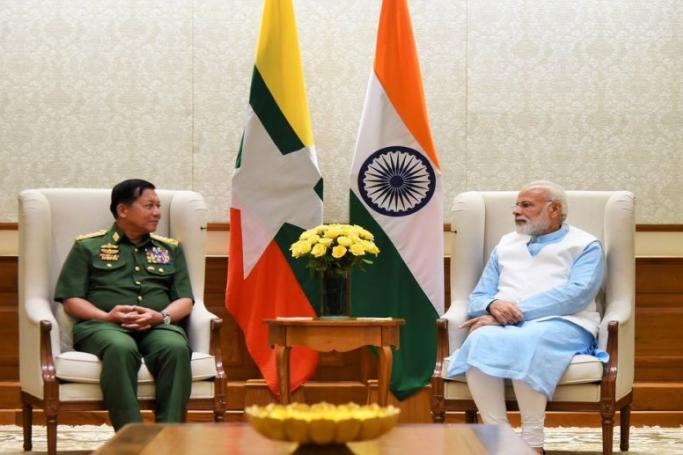Foreign policy experts and representatives from several nations neighbouring Myanmar meeting in Delhi called for reduction of violence by all sides in that conflict-ridden country this week, PTI reports.
The participants at the second round of 'Track 1.5' discussions on Myanmar carried out a comprehensive review of the situation after the Myanmar military junta resorted to air strikes on Pazagyi village in Sagaing region, massacring over 170 people.
The dialogue was hosted by the Indian Council for World Affairs (ICWA). The first round of the dialogue was held in Bangkok in March.
In the political dialogue realm, meetings that include members other than current government officials are termed Track 1.5 and Track 2 dialogues.
The Delhi meeting included Indian officials, Myanmar junta midlevel representatives, and officials from ASEAN countries, namely Cambodia, Laos, Thailand and Vietnam, and Indonesia as ASEAN’s current chair.
The attending countries agreed that this Track 1.5 process should be "complementary" to ASEAN's own efforts to try to resolve the crisis, a source told Asia Nikkei. Both India and Bangladesh have complained about the slow progress exhibited by ASEAN in tackling this crisis that negatively impacts the region.
Sources said the Delhi meeting participants called for reduction of violence by all sides and underlined the need for creating political space for dialogue in Myanmar, PTI reports.
The discussions covered the current situation in Myanmar, reduction of violence, countering transnational crimes, national reconciliation, and delivery of humanitarian aid, according to the news agency.
It was agreed that delivery of humanitarian aid to Myanmar is to be expedited and that countries of the region need to continue supporting ASEAN's efforts. The participants also agreed to continue the dialogue.
This week has seen an uptick in dialogue with the Myanmar military junta in Naypyidaw including the visit of the former UN Secretary General Ban Ki-moon and Thai Foreign Minister Don Pramudwinai and his special envoy on Myanmar, Pornpimol Kanchanalak. Ban says he is pursuing peace but has been rapped for his visit to Naypyidaw, as a member of The Elders, with critics claiming it helps provide legitimacy to an illegitimate regime.
Kim Joliffe, a Myanmar analyst, told Asia Nikkei that the Track 1.5 dialogue has delivered a debilitating blow to ASEAN's credibility and clout as the institution that can lead the world's response to Myanmar. He told the magazine that alternative initiatives have undermined ASEAN and left key stakeholders such as Myanmar's parallel National Unity Government (NUG) in the cold.
The Delhi Track 1.5 meeting followed an earlier meeting in Bangkok in March.
Thai commentator Kavi Chongkittavorn, writing for the Bangkok Post, said there were more divergences than convergences in views that emerged from the Track 1.5 Dialogue held between ASEAN members and dialogue partners, including representatives from Myanmar, at this Bangkok meeting.
The commentator noted that at this juncture, both ASEAN and Myanmar have their own modus operandi to follow. Last November, ASEAN reconfirmed its Five Point Consensus (5PC) after a thorough review.
The regional body reaffirmed its guidelines toward a peaceful settlement, which critics said little progress has been made since its promulgation in April 2021. For the military junta in Naypyidaw, the 5PC is their preferred pathway, Kavi Chongkittavorn said.
This is despite the fact that the junta has not been adhering to the 5PC guidelines aimed at dialogue and pursuing peace.
Myanmar has been in crisis since the February 2021 military coup, with hostilities picking up pace as the junta attempts to crack down on the myriad resistance groups, and seek an election that it hopes will provide a fig-leaf of democratic legitimacy over military rule.
Myanmar is one of India's strategic neighbours and it shares a 1,640-kilometre-long border with a number of northeastern states, including militancy-hit Nagaland and Manipur. Indian PM Narendra Modi has been pursuing an Act East policy that seeks to engage with India’s eastern and south east Asian neighbours. The Myanmar crisis has placed India in a quandary as it seeks to look east but finds that thrust means engagement with whoever is in power in Naypyidaw.
The Myanmar junta may be viewed internationally as a pariah state but many governments still remain engaged with the generals in Naypyidaw.












